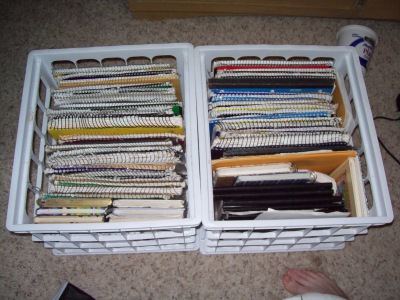According to an anecdote in Keeping a Journal by Trudi Strain Trueit, E.B. White (author of Charlotte’s Web and The Trumpet of the Swan) kept a journal for over 20 years, but requested that all his journals be destroyed after his death.
I can’t imagine doing such a thing–either destroying the journals or requesting that they be destroyed.
Perhaps I’m just a pack-rat, never wanting to throw anything away. I’d prefer to think that it’s the family historian and the teacher in me that wants to preserve journals.
Journals are the stories of our lives, written in our own words. They go beyond anecdotes to express our emotions, our priorities, our perceptions. Our journals show our real selves–the selves that perhaps no one has ever seen in entirety. Our journals show our growth, or our lack of growth. Our journals are little pieces of ourselves, preserved for our own reference and that of future generations.
At least that’s what I think.
My journals fill two crates. Over the past twelve or so years, I have filled at least forty notebooks with my thoughts, my feelings, my interactions. Some of my journals are fancy, with elaborate binding; others are simple wire bound notebooks with their covers long since torn off. But all of my journals contain something in common: a distilled drop of myself.

I can’t imagine destroying my journals, because my journals are a part of me. They tell the stories that have shaped my life, the hurts that have scarred me, the truth that has set me free.
I open a journal from spring of 2003 and read an account of my ongoing struggle to give God my husband. A journal from 2005 contains ideas for youth group games, for the officer position I held in my cooperative residence hall, and for a novel I was going to write (still might!) In a journal from late 2006, I wrote about discipleship, about the role of single women in the church, and about what God was speaking to me through the Word. One of last year’s journals asks why I am so restless. I quote: “Lord, why am I so restless? My journal makes it clear. A hundred thoughts whistling through my head.” That same journal contains the words to songs I sung in Mexico and reflections on Mexican religion, food, and teaching.
I rarely open one of my journals without learning something. I am reminded of the dark, dark times that God has brought me through. I am reminded of the mountain top experiences that peek/peak (how’s that for a pun?) through the valleys. I am reminded of lessons learned and battles won. I am reminded of the voice of God. I remember my goals and see how I’ve worked to accomplish them.
And a little part of me likes to think that others could learn something from these journals too. I like to think that maybe my boy struggles will someday help a girl who’s trying to put God first while desperately longing to be married. I like to think that the story of God’s faithfulness through my depression might inspire someone else to fix their eyes on Jesus–even when depression means they can’t see straight. I like to think that maybe my life, read as an open book, might be a story that could positively impact someone else’s life.
The impact of my journals might come from me re-reading, remembering, and sharing my stories verbally. I might lend them to a friend, like I did once for a friend who was going through relational difficulties. Perhaps they will be published after I die (Never let it be said that I DIDN’T have delusions of grandeur.) Or maybe they will be read by a great-granddaughter, who will be able to meet me for the first time through my hundred year old writings. But I intend for my journals to be kept, to be read, to be used.
My story is too important, too full of the grace of God, for my story to die. So is yours. So if you want your journals destroyed like E.B. White’s were, ask someone else to do it. I’m not willing that the pages of our testimonies be lost.
